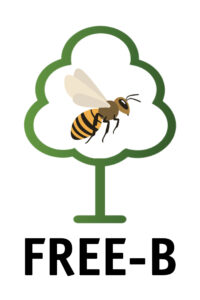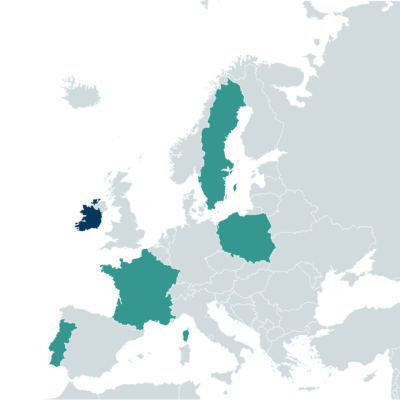
FREE-B Studying FREE-living honey Bee colonies in Europe: nature-based solutions to safeguard diversity, ensure resilience, and promote transformative change in beekeeping
Call
Duration
01/02/2025 – 31/01/2028
Total grant
Approx. 1.1 mil. €
More information
Grace McCormack
grace.mccormack@universityofgalway.ie
Partners of the project
- Molecular Evolution and Systematics Laboratory, Earth and Life Sciences, School of Natural Sciences, University of Galway, Ireland
- Honey Bee Watch, Seandoire, Corcullen Galway, Ireland
- Evolution, Genomes, Behavior, Ecology (EGCE), University of Paris-Saclay, France
- Mountain Research Center, Polytechnic Institute of Bragança, Campus de Santa Apolónia, Portugal
- Department of Genetics, Kazimierz Wielki University, Department of Genetics, Bydgoszcz, Poland
- Department of Ecology, Swedish University of Agricultural Sciences, Uppsala, Sweden

Context
Whereas two decades ago European honey bees (Apis mellifera) were largely considered extinct in the wild, independent research since then has evidenced their presence throughout Europe. However, up until now these studies have mostly operated in isolation, not yet benefitting from pooled resources, such as data, protocols, best practices, and communications.
Main objectives
FREE-B aims to connect five studies in France, Ireland, Poland, Portugal, and Sweden in an effort to better understand the biological, behavioral, and environmental factors that bolster survival among free-living honey bee colonies via natural selection in comparison to their managed counterparts in apiaries, which have experienced unsustainable mortality rates that exceed 30% in some European countries.
Main activities
Relying on both researchers within the consortium plus individual citizen scientists to gather data on these rare “wild” populations, FREE-B will initiate a communications strategy to inform and invite beekeepers and beekeeping associations within its five study areas to participate, thus establishing a network of “Bee Guardians.” In conjunction with the five teams, nest site locations will be sought and recorded in a GIS-based system, said colonies will be monitored at least four times annually (in some cases every fortnight), and samples collected in order to sequence genomes and test pest and pathogen loads in comparison to samples taken from nearby managed apiaries. Additionally, said genomic tests, coupled with wing morphology classifications, will help to identify lineages within the 10 Am subspecies on the European continent and signatures of adaptation to living in the wild.
Findings will be compiled and disseminated via peer-reviewed articles as well as “translated” into layperson’s terms and communicated to all participants, plus three other key constituents in particular who may directly or indirectly affect these bees’ well-being: policymakers who can pass or amend laws to ensure their protection, veterinarians who oversee their management, and foresters who often encounter nest sites in the wild. Additionally, FREE-B will convey to beekeepers and beekeeping associations any lessons that could be applied to lower mortality rates of their managed colonies as well as improve the sustainability of their beekeeping practices. Moreover, FREE-B will pilot the potential harnessing of free-living colonies’ “pure” genetics by collecting swarms, placing them in treatment-free hives, and observing whether they bolster tolerance to and/or resistance against the common diseases afflicting managed colonies within the five participating countries.
Although Apis mellifera is universally recognized for its invaluable contributions to pollination, which ensures food security and biodiversity around the planet, populations in the wild have not yet received the global scientific attention nor protections that they deserve. FREE-B aims to change that by extensively researching free-living honey bees’ survival tactics and create models that future studies can emulate throughout Europe and beyond.

